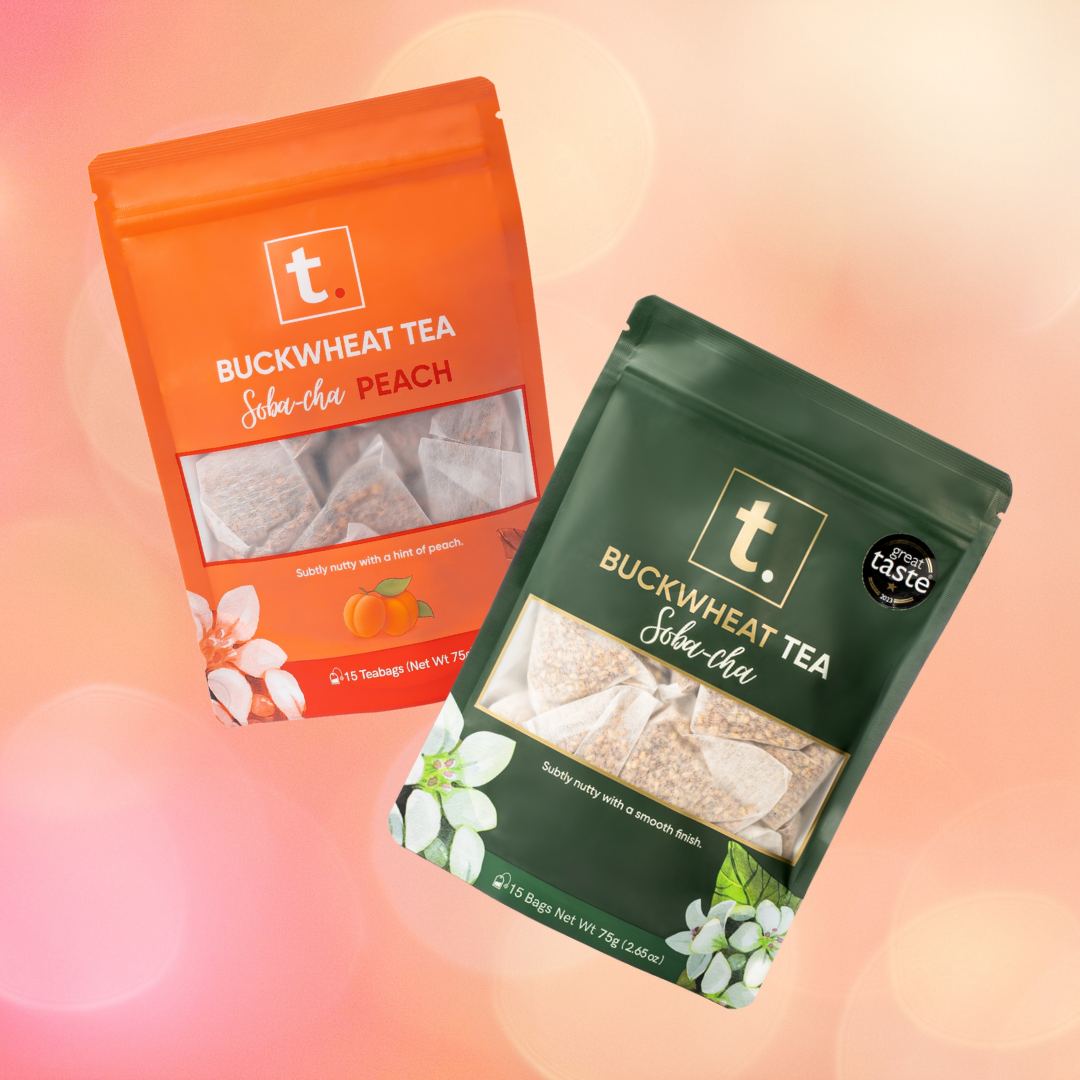
Buckwheat tea, also known as soba-cha, is a herbal tea made out of roasted buckwheat seeds.
Besides its delicious nutty & earthy flavour, the tea is known for its ‘medicinal’ properties, and has been consumed in East Asia for centuries. It’s made using the ‘tartary’ variety of buckwheat, which is known to be higher in nutritional & antioxidant content when compared to common buckwheat. Specifically, it is said to contain almost 100x more of the antioxidant ‘rutin.’
Here is a look at the various ways buckwheat can help for various ailments and illnesses, making it a very powerful and healthy brew.
Buckwheat Tea for Cholesterol
Buckwheat tea is known to have a positive impact on cholesterol levels.
The antioxidant rutin, which the tea has an abundance of, helps strengthen blood vessels and reduce inflammation, which lowers the risk of cholesterol build-up in the arteries.
Rutin and other antioxidants in buckwheat tea also help (1) protect the body from ‘oxidative stress,’ which is what typically leads to LDL cholesterol formation in the arteries, and (2) manage blood pressure levels which are correlated with cholesterol levels and cardiovascular risk.
Studies also suggest that buckwheat tea can help regulate lipid metabolism, which is how your body processes fats - this, in turn, leads to healthier levels of cholesterol and triglycerides in the blood.
Buckwheat Tea for Thyroiditis
Thyroiditis, which includes conditions like Hashimoto's thyroiditis, involves inflammation of the thyroid gland, often leading to hypothyroidism or hyperthyroidism.
Buckwheat tea contains rutin and other antioxidants with strong anti-inflammatory effects, which can help (1) reduce inflammation and (2) fight oxidative stress, preventing damage to cells in the thyroid gland, and (3) support the overall health of the thyroid gland.
Additionally, compounds in buckwheat tea help modulate the immune system, which reduces the autoimmune response of the immune system attacking the thyroid gland - protecting it from further damage.
Buckwheat Tea for Diabetes
Buckwheat tea has also been shown to be a good tea to help with diabetes, as it can regulate blood sugar levels and improve overall metabolic health.
The tea contains a compound called D-chiro-inositol, which can improve insulin sensitivity, meaning the body can use insulin more effectively and reduce blood glucose levels.
Buckwheat tea is also rich in antioxidants such as rutin, which can reduce oxidative stress and has inflammatory properties. Both of these can help prevent complications associated with diabetes.
Buckwheat Tea for Rheumatoid Arthritis
Buckwheat tea has been shown to provide benefits for people with rheumatoid arthritis (RA), namely due to its anti-inflammatory properties, antioxidant content, and effects on the immune system.
Buckwheat tea is rich in antioxidants, including rutin which has strong anti-inflammatory properties. As RA is characterised by chronic inflammation of the joints, the tea can help reduce inflammation and reduce the joint pain and swelling associated with RA.
Both the anti-inflammatory and antioxidant properties can therefore contribute to overall pain relief by reducing inflammation and oxidative damage, easing the chronic pain that accompanies RA.
The antioxidant properties can also help combat oxidative stress, which helps prevent further joint damage. And finally, some studies suggest that rutin and other compounds in buckwheat tea can help modulate the immune system, reducing the severity of autoimmune responses.
Buckwheat Tea for Irritable Bowl Syndrome (IBS)
Buckwheat tea can offer benefits for individuals suffering with Irritable Bowel Syndrome (IBS) due to its soothing, anti-inflammatory, and digestive health-promoting properties.
Since IBS often involves inflammation of the digestive tract, the anti-inflammatory effects of rutin (contained in buckwheat tea) helps alleviate IBS symptoms by reducing inflammation in the gut. Rutin, a powerful antioxidant, can also help protect cells in the digestive tract and support overall gut health and reduce IBS flare-ups.
The tea is also rich in dietary fire, which can aid in regulating bowel movements, and also contains prebiotics, which promote the growth of beneficial gut bacteria. Finally, drinking warm tea in general is found to be soothing for the digestive system - and buckwheat tea in particular has a calming effec that can relax the gut muscles and reduce spasms, which are common in IBS.
Buckwheat Tea for Raynaud’s Disease
Buckwheat tea might offer some benefits for individuals with Raynaud's disease, primarily due to its rich content of the antioxidant rutin, which improves blood vessel health and blood circulation.
Rutin is found in high concentrations in buckwheat tea, and is known for its ability to strengthen blood vessels, reduce capillary fragility, and improve blood circulation. This is particularly beneficial for Raynaud's disease, which is characterised by poor blood flow to extremities.
The compounds in buckwheat tea also help dilate blood vessels and reduce the tendency of blood to clot, which can enhance blood flow to fingers and toes, areas commonly affected by Raynaud's disease. The anti-inflammatory properties of the tea also help reduce inflammation in blood vessels which may contribute to lessening the severity of the attacks.
While buckwheat tea can be a helpful addition to prevent and help with various conditions, make sure you combine it with other healthy lifestyle choices, such as maintaining a balanced diet, exercising regularly, managing your stress well, and avoiding smoking.























